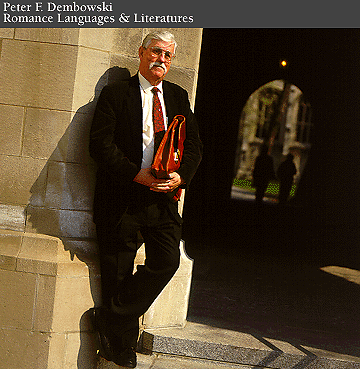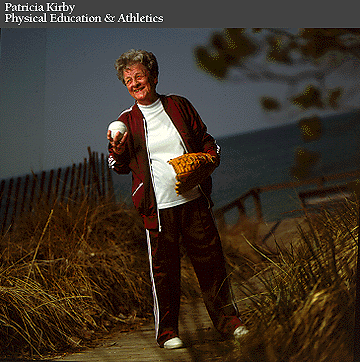
The University of Chicago Magazine
June 1997
Continued

A distinguished service professor emeritus in Romance languages & literatures, Peter Dembowski continues to teach part time in the department. ("This quarter I am Mr. Staff," he says.) In his three decades at Chicago, the French literature scholar--who held appointments in linguistics and the College, as dean of students in Humanities, and as resident master of Snell-Hitchcock Hall--spent hours outside the classroom advising students on intellectual, professional, and personal issues.
I had two truly great teachers. One was in high school in Poland. The second was a university professor--a dour Scotsman in British Columbia named Morrison. He was a professor of English, and he always gave the impression to his students that he was straight with them. I was a foreigner, a French-speaking Pole, and he gave me a C. I asked him if my English was so bad, and he said, "Your English was awful, but your ideas were worse!" Now, how do you not fall in love with a guy like that? He gave me the first idea that I might be a teacher.
I say to young teachers, "If you are not tired after one hour, and if you are not scared before, maybe you should be something else." You cannot work for immediate success. Teaching is not a seduction; you are not there to overpower the student with your emotions or your personality. There has to be more than something like going to a good movie. The student has to be influenced by the thing that you are teaching....
In the spring of 1969, the president said on a Friday that professors could take part of the class hour to talk about the [political] situation in the University. So I wrote on the blackboard, "If anyone wants to discuss the state of the University, we can do so." We were studying Tristan and Isolde, and there was a young woman crying. She had tears coming out, and I thought she was crying about the state of the University, so I asked her what was troubling her, and she said, "Did Tristan and Isolde really have to die?"
That was the only time in class that I wanted to kiss a student--because she is supposed to be thinking about Tristan and Isolde, even if the world is falling apart!

Patricia ("Pat") Kirby, associate professor emerita of physical education & athletics, taught and coached--volleyball, basketball, softball, and badminton--at Chicago for 22 years. She coached the women's softball team to two state championships, but was best known for her support and empathy on and off the playing fields, serving hundreds of students as a friend and adviser.
The most important thing is to allow time for the students, to show an interest and, above all, to listen to what they have to say because it can tell you things about your teaching. A young person is sometimes so eager to get on with life and to be a success that sometimes we don't listen when we should be listening. But if you listen, then you'll get to know people and that's where the joy is--to watch as they progress through life. I know it is for me, and I still have contact with someone in every graduating class.
Being able to outsmart your opponent is not exactly minimal in importance. The mind has a great deal to do with your athletic success, especially if it's a competitive situation. I could accept it if a student didn't catch a ball or lost it dribbling downcourt, but a mental error always bothered me a great deal.I tried to teach students that the mind can't function without the help of the body, because that's where its home is.
[Follow link below to continue story.]
Continue reading "STYLE AND SUBSTANCE"
Go to:
- INVESTIGATIONS
- CHICAGO JOURNAL
- EVENTS
- LETTERS
- CHICAGOPHILE
- Feature story, "Theory in Practice"
- Feature story, "Style and Substance"
- Feature story, "Sampling Paradise"
- Feature story, "Vocal Ease"
- CLASS NEWS
- DEATHS
- BOOKS BY ALUMNI
- IN THE CLUBS
Return to June 1997 Table of Contents